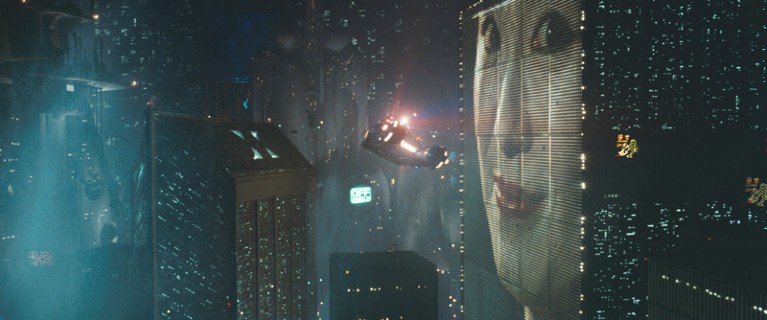
A still from the 1982 film adaptation Bladerunner.Credit: Entertainment Pictures/Alamy
Do Androids Dream of Electric Sheep? Philip K. Dick Doubleday: 1968.
When science-fiction writer Peter Watts first opened Philip K. Dick’s 1968 Do Androids Dream of Electric Sheep?, a word caught his eye. It was “friendlily”. How had Dick got that past an editor? As Watts told me: “I knew at that point that Dick had to be some kind of sick genius.” Further on in the novel are the boldly redundant “disemelevatored” and the sublime “kipple” — a word for ‘junk’ that encapsulates the stuff’s sinister tendency to multiply entropically. Only William Shakespeare coined neologisms as brazenly.
Yet to debate Dick’s strengths as a stylist is to miss the point of Androids. For, as with much of his oeuvre (44 novels, 121 short stories and 14 short-story collections), it is ideas that propel the book into the imaginative stratosphere — and inspired director Ridley Scott to craft the masterly 1982 film adaptation, Blade Runner.
Many know of the book solely through the film. But Blade Runner is only nominally based on the original. Dick’s prescience in Androids lies in his portrayal of a society in which human-like robots have emerged at the same time as advances that make people more pliable and predictable, like machines. The film eschews the intricacies of plot that bring this to the fore in the book.

Philip K. Dick, pictured in 1982.Credit: Philippe Hupp/Gamma-Rapho/Getty
Dick (1928–82) was in many ways as paradoxical as his work. He read widely and was well versed in the science of his day, such as the cybernetics of Norbert Wiener. Yet his formal education ended with school. Shortly after enrolling at the University of California, Berkeley, in 1949 — to study subjects including philosophy — he dropped out, possibly owing to the vertigo and agoraphobia that troubled him throughout his life. The popular image of him, which he encouraged, was of a hallucinogen-addled mystic. But it was amphetamines that fuelled Dick’s most heroic bouts of productivity; in 1963–64, he wrote 6 novels in 12 months. His extraordinarily fecund imagination did the rest.
Dick wrote Androids in 1966. Others of his books, such as Ubik (1969) and his great alternative history The Man in the High Castle (1962), were also garlanded with praise. Yet none has perhaps so viscerally affected researchers as Androids.
Set in a post-apocalyptic 1992, the book follows bounty hunter Rick Deckard in a risky mission to “retire” (destroy) six state-of-the-art Nexus-6 androids, who have fled to Earth after killing their human masters in a Martian colony. Nexus-6s can be distinguished from humans through the “Voight-Kampff test”. This assesses capacity for empathy, a human facility that even the most intelligent androids lack.
Deckard embarks on the hunt amid dreams of buying a pet with the reward. Nuclear fallout has extinguished most animal life, and pets are major status symbols. Life-like robotic animals abound, such as the black-faced sheep that Deckard owns; but they are ultimately disappointing. Through caring for an authentic beast, he and his wife Iran hope to transcend the existential fug of living on a planet abandoned by all but the dregs of humanity. Adherents of the religion Mercerism, they feel bound to share such transcendental experiences with others by means of an “empathy box”, a machine that meshes human consciousness.
These days, academic discourse around the work dwells on what distinguishes humans from sophisticated robots — driven by the film. Dick’s approach was more nuanced. The name Deckard, for instance, echoes that of seventeenth-century French philosopher René Descartes, who asked whether it was possible to distinguish, without direct access to their minds, a human from an automaton. Deckard explores that ambiguity, wondering uneasily whether he himself is an android. He passes the Voight-Kampff test but, towards the end of the novel, he recognizes a kind of kinship with his quarry. “The electric things have their lives, too,” he says. “Paltry as those lives are.”
Whether such machines should also be accorded rights is a question that researchers wrestle with today. Artificial-intelligence specialist Joanna Bryson, among others, has argued that granting autonomous robots legal personhood would be a mistake: it would render their makers unaccountable. Bryson, an admirer of the book, believes that the mass production of machines with human-like goals and ambitions should be prohibited.
But Dick’s chief preoccupation in Androids is not the almost-human robot as moral subject. His synthetic beings are inhuman in important ways. They are unable to participate in the rituals of Mercerism, for instance. And their leader, Roy, is a brute who is summarily dispatched. (The film endows him with empathy and even literary flair, saving Deckard’s life as he delivers an unforgettable swansong about C-beams that “glitter in the dark near the Tannhäuser Gate”.)
Rather, Androids is a meditation on how the fragile, unique human experience might be damaged by technology created to serve us.
The idea that people risk injuring themselves, physically or psychically, by anthropomorphizing machines is not far-fetched. We bond easily with machines. A study last year showed that many people are embarrassed to ask digital assistants such as Apple’s Siri questions that betray their own ignorance (S. Kim et al. Psychol. Sci. 29, 171–180; 2017). As far back as the 1990s, electronic pets called Tamagotchis that demanded near-constant care led some owners to neglect important duties. The built-in compliance of robotic sex dolls currently in development risks eroding relationships.
Androids explores this blurred human–machine boundary through Deckard’s existential anxiety, and through the “Penfield mood organ”. This device allows humans to dial up urges or emotions, such as “the desire to watch TV, no matter what’s on it”, by inputting a number. Named after Wilder Penfield, the real-life twentieth-century neurosurgeon who showed that brain stimulation could elicit sensations and visions, the organ reifies Dick’s fear that humans could become more robotic. In this, Dick has been proved spectacularly right. As bioethicist Matt Lamkin has observed, pharmaceuticals that make people happier or more productive — but less contemplative — approximate the mood organ’s effect. The smartphone may be the ultimate mood organ: rather than dialling up their own emotions, however, users are increasingly manipulated by the algorithms of tech titans.
To help counter such dehumanizing effects, philosopher Evan Selinger and law scholar Brett Frischmann say that it is time to devise a reverse Turing test. Rather than identifying machines that are indistinguishable from humans, as the original does, the reverse test would determine the extent to which humans remain truly human.
Dick would not have been surprised by any of it. In Androids, Iran senses her own blunted emotional response to a life in which caring for machines is the apogee of existence for many, and Earth has been deserted by the smartest. Her answer is to schedule a six-hour bout of self-accusatory depression twice a month.

 Blade Runner 2049: a dystopian masterwork
Blade Runner 2049: a dystopian masterwork
 He wrote the future
He wrote the future
 Learn to tell science stories
Learn to tell science stories
 Science fiction from Nature Futures
Science fiction from Nature Futures




